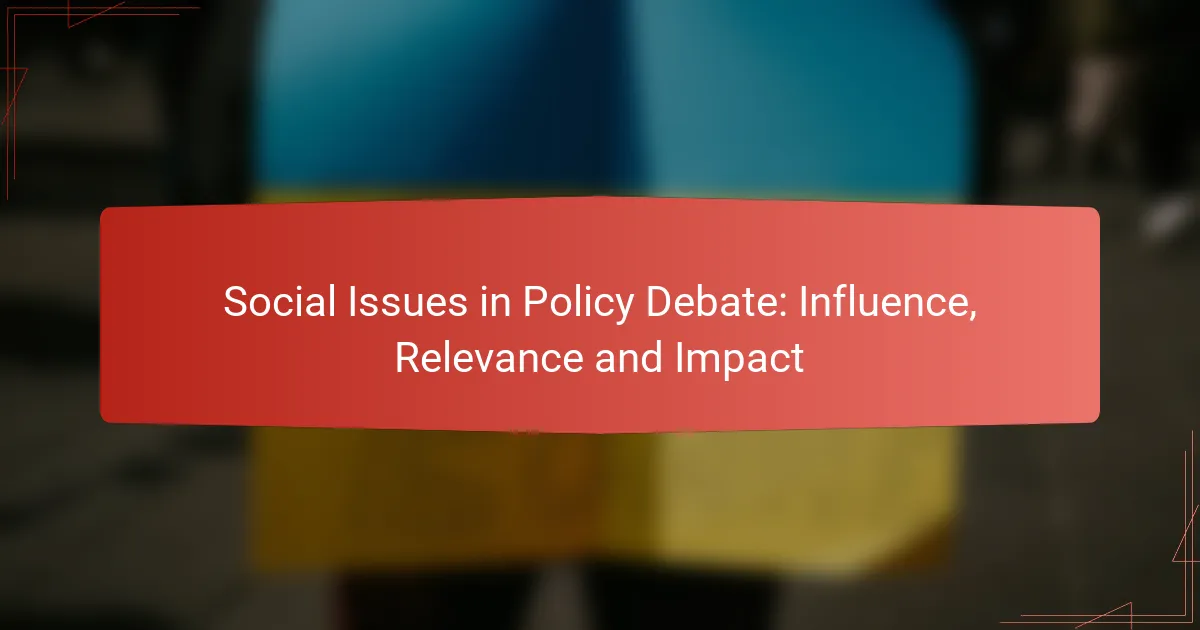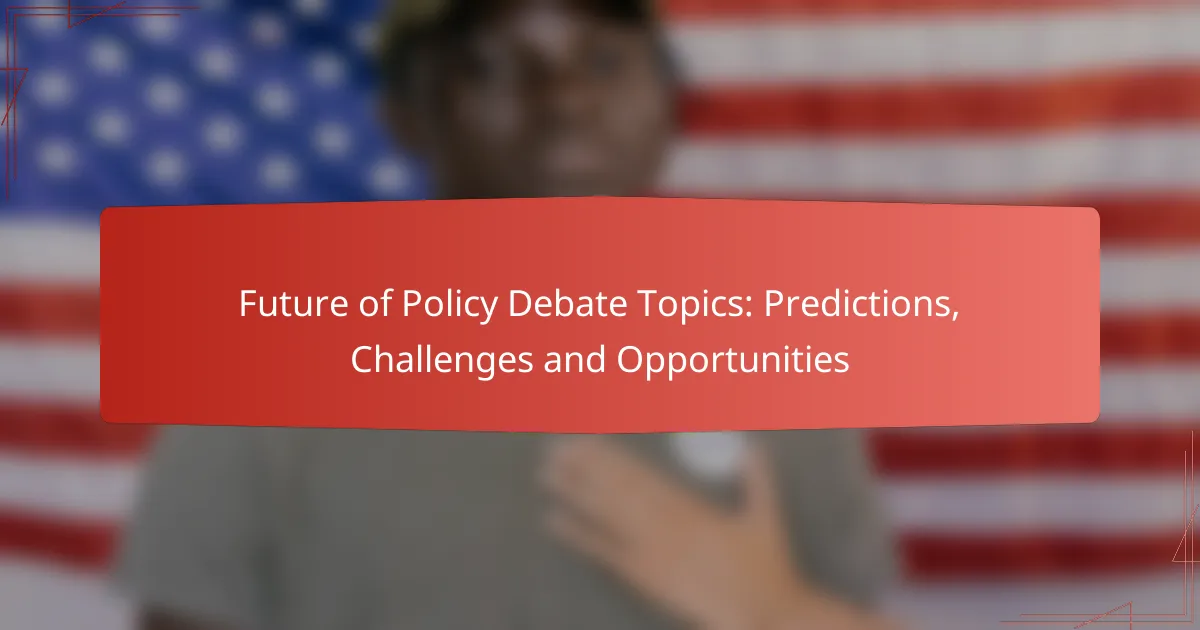Social issues play a crucial role in shaping policy debates in the United States, as they bring to light the diverse needs and concerns of various communities. By focusing on topics such as healthcare access, climate change, and education inequality, policymakers can drive meaningful change and promote social justice through informed legislation and public programs.
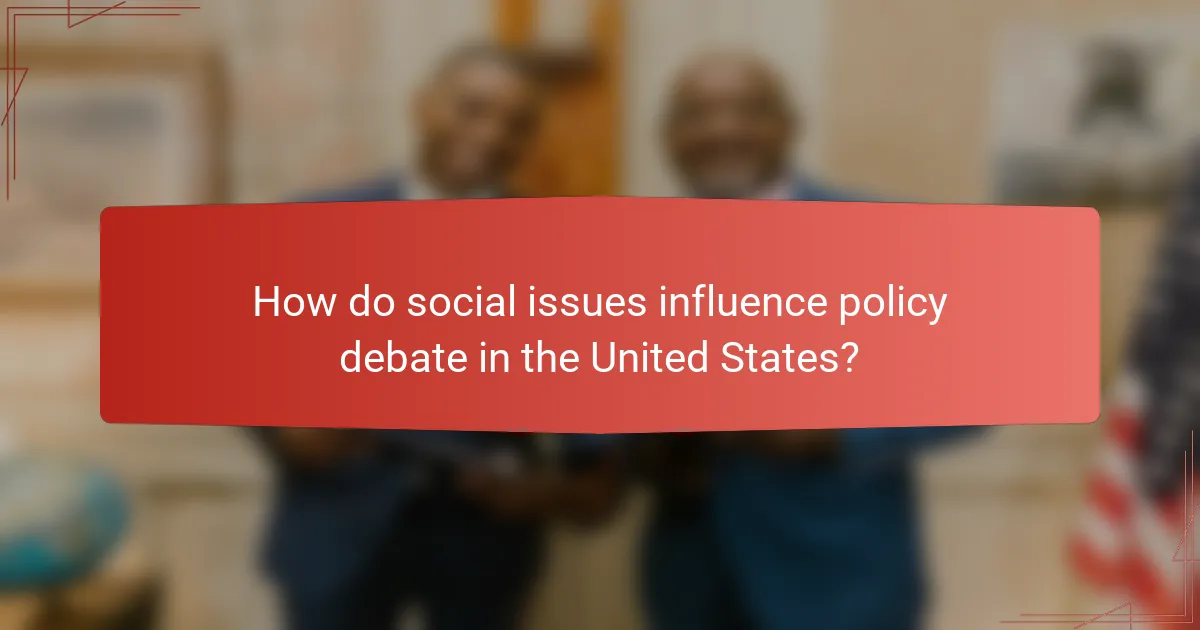
How do social issues influence policy debate in the United States?
Social issues significantly shape policy debate in the United States by highlighting the needs and concerns of various communities. Policymakers often consider these issues to address inequalities and promote social justice, which can lead to changes in legislation and public programs.
Impact of poverty on policy decisions
Poverty plays a critical role in shaping policy decisions, as it affects access to resources like education, healthcare, and housing. Policymakers often prioritize initiatives aimed at poverty alleviation, such as welfare programs and job training, to address the needs of low-income populations.
For instance, debates around increasing the minimum wage or expanding food assistance programs are often driven by the desire to reduce poverty levels. Understanding the economic implications of these policies is essential for effective governance.
Role of racial inequality in legislative discussions
Racial inequality is a prominent factor in legislative discussions, influencing policies related to criminal justice, education, and employment. Lawmakers are increasingly aware of systemic disparities faced by racial minorities, prompting calls for reforms aimed at promoting equity.
Examples include discussions around police reform and affirmative action policies, which aim to address historical injustices. Engaging with community leaders and stakeholders is crucial for developing effective solutions that resonate with affected populations.
Gender issues shaping public policy
Gender issues significantly impact public policy, particularly in areas like reproductive rights, workplace equality, and domestic violence. Policymakers often face pressure to enact laws that protect and promote gender equity, reflecting societal changes and advocacy efforts.
For example, debates over paid family leave and equal pay legislation are driven by the need to support working families and reduce gender disparities in the workforce. Understanding the implications of these policies can help create a more inclusive society.
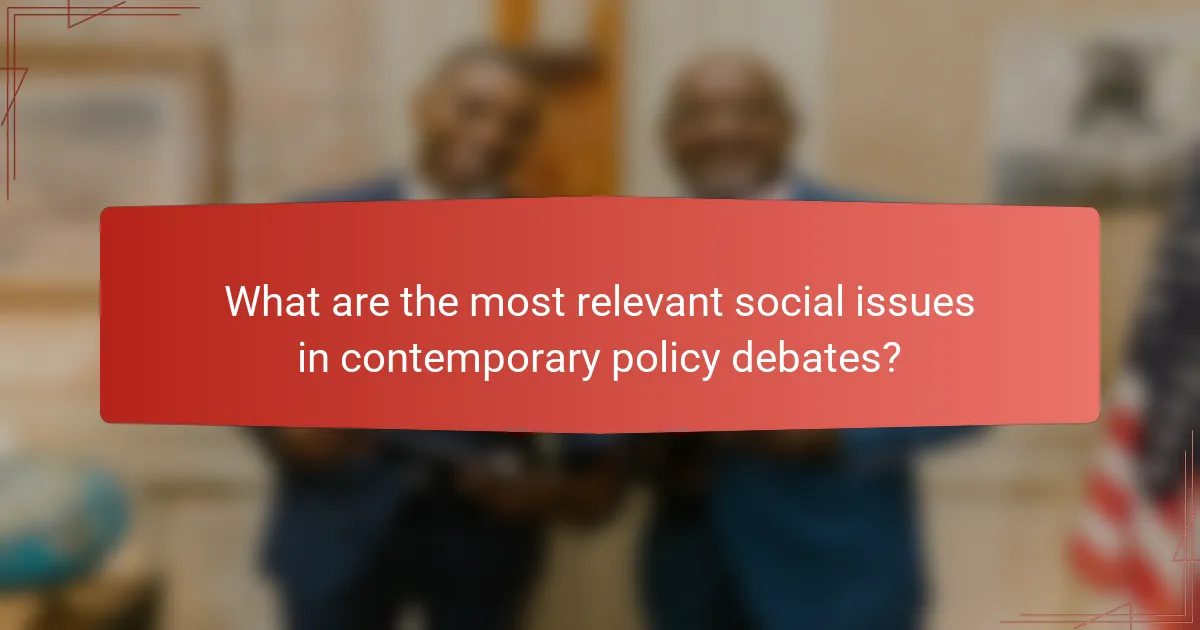
What are the most relevant social issues in contemporary policy debates?
Contemporary policy debates often center around social issues that significantly impact communities and individuals. Key topics include healthcare access and affordability, climate change and environmental justice, and education inequality, each influencing public policy and societal well-being.
Healthcare access and affordability
Healthcare access and affordability remain critical social issues, affecting millions globally. Many individuals face barriers such as high costs, lack of insurance, and insufficient healthcare facilities, which can lead to adverse health outcomes.
Policymakers must consider various strategies to improve access, such as expanding public insurance options, regulating drug prices, and investing in community health programs. For instance, countries with universal healthcare systems often report better health outcomes and lower overall costs.
Climate change and environmental justice
Climate change and environmental justice are increasingly relevant in policy discussions, as they disproportionately affect marginalized communities. These groups often experience higher exposure to pollution and fewer resources to adapt to climate impacts.
Effective policies should address both environmental sustainability and social equity. This can include transitioning to renewable energy sources, enforcing stricter pollution regulations, and ensuring that vulnerable populations have access to resources for climate adaptation. Initiatives like community solar projects can empower local residents while promoting sustainability.
Education inequality
Education inequality is a pressing social issue that hinders social mobility and economic growth. Disparities in funding, resources, and opportunities often leave low-income students at a disadvantage compared to their wealthier peers.
To combat education inequality, policies should focus on equitable funding for schools, access to quality early childhood education, and support for underrepresented students in higher education. Programs that provide scholarships or mentorship can help bridge the gap and create more equitable educational outcomes.
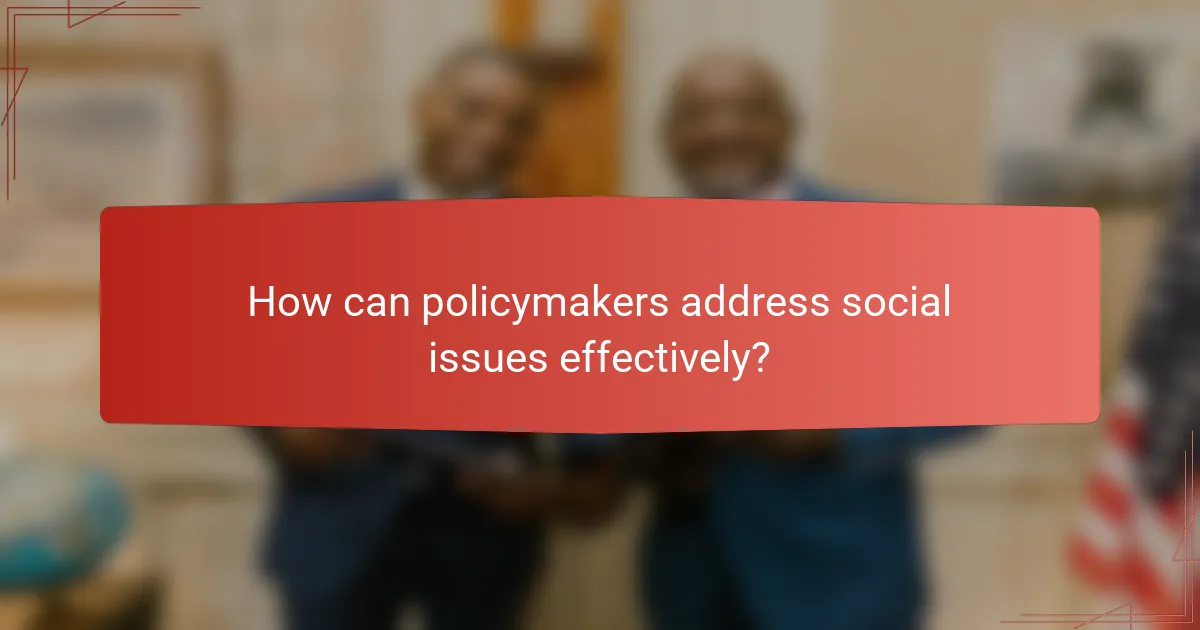
How can policymakers address social issues effectively?
Policymakers can address social issues effectively by implementing targeted strategies that engage communities, utilize data for informed decisions, and collaborate with non-profit organizations. These approaches ensure that policies are relevant, impactful, and reflective of the needs of the population.
Community engagement strategies
Community engagement strategies involve actively involving citizens in the policymaking process. This can include town hall meetings, surveys, and focus groups to gather input and feedback from diverse community members.
Effective engagement fosters trust and transparency, enabling policymakers to understand the specific social issues affecting their constituents. For instance, local governments may hold regular forums to discuss housing, education, or health care concerns, ensuring that policies are shaped by the voices of those they impact.
Data-driven policy formulation
Data-driven policy formulation relies on collecting and analyzing relevant data to inform decisions. Policymakers should utilize both qualitative and quantitative data to identify trends, needs, and potential outcomes of proposed policies.
For example, using demographic data and social indicators can help identify areas with high unemployment rates or inadequate access to healthcare. This approach allows for targeted interventions that are more likely to yield positive results, such as allocating resources to underserved communities.
Collaborations with non-profit organizations
Collaborating with non-profit organizations can enhance the effectiveness of social policies by leveraging the expertise and resources of these entities. Non-profits often have established relationships within communities and can provide valuable insights into local needs and challenges.
For instance, partnerships with organizations focused on homelessness can help policymakers develop comprehensive strategies that address both immediate needs and long-term solutions. Such collaborations can also facilitate the implementation of programs, ensuring that resources are utilized efficiently and effectively.
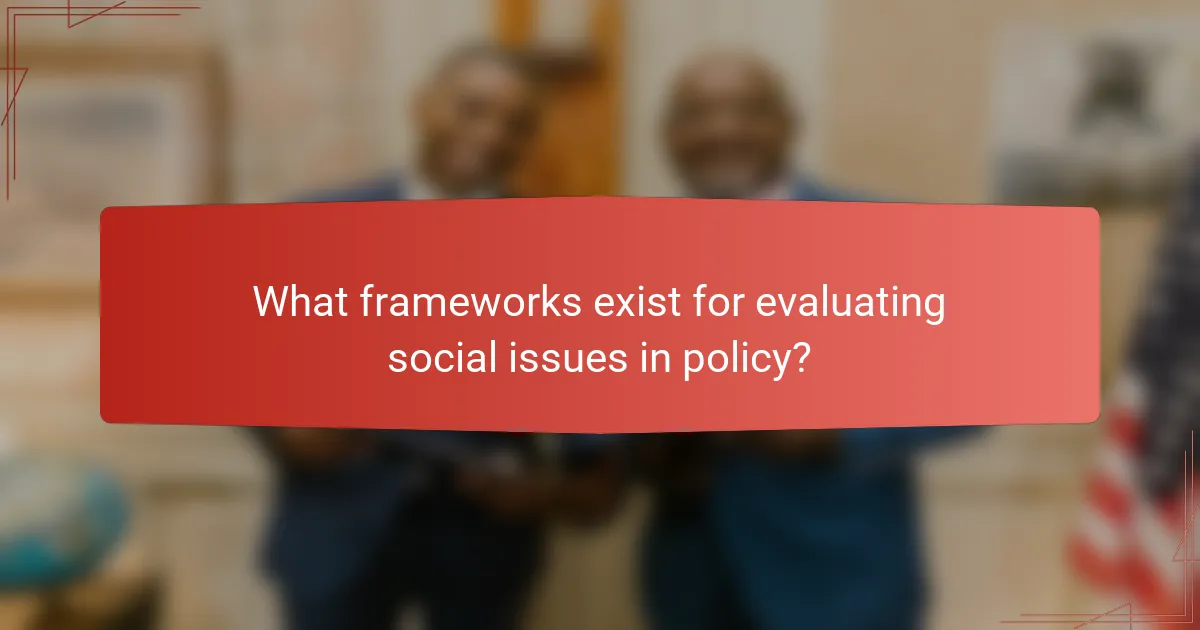
What frameworks exist for evaluating social issues in policy?
Frameworks for evaluating social issues in policy include structured methods that assess the potential effects of policies on various social dimensions. These frameworks help policymakers understand the implications of their decisions and ensure that social considerations are integrated into the policy-making process.
Social impact assessments
Social impact assessments (SIAs) are systematic processes used to evaluate the potential social effects of proposed policies or projects. They typically involve identifying stakeholders, predicting impacts, and suggesting measures to mitigate negative outcomes. SIAs are essential for understanding how policies affect communities, especially vulnerable populations.
Key steps in conducting an SIA include stakeholder engagement, data collection, impact analysis, and reporting. For example, a local government might use an SIA to assess the effects of a new housing development on existing neighborhoods, focusing on aspects like displacement, community cohesion, and access to services.
Equity-focused policy analysis
Equity-focused policy analysis examines how policies affect different demographic groups, particularly marginalized communities. This framework emphasizes fairness and seeks to identify disparities in access to resources, opportunities, and outcomes. It encourages policymakers to consider equity as a core principle in their decisions.
To implement equity-focused analysis, policymakers should assess the distribution of benefits and burdens across various groups. For instance, when evaluating a healthcare policy, analysts might look at how access to services varies by income level, race, or geographic location. This approach helps ensure that policies promote social justice and do not inadvertently reinforce existing inequalities.
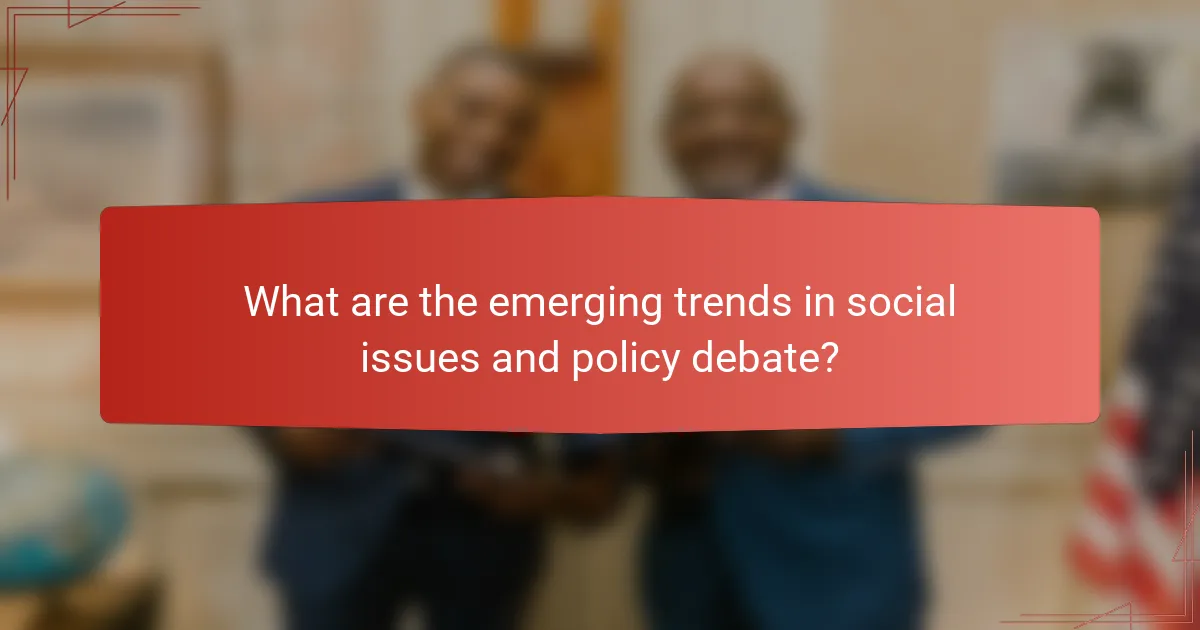
What are the emerging trends in social issues and policy debate?
Emerging trends in social issues and policy debate reflect a growing recognition of the complexity of societal challenges. Policymakers are increasingly addressing multifaceted issues that require innovative solutions and collaborative approaches.
Increased focus on mental health policies
The emphasis on mental health policies has surged in recent years, driven by rising awareness of mental health’s impact on overall well-being. Governments are prioritizing initiatives that promote mental health services, reduce stigma, and improve access to care.
For example, many countries are implementing community-based mental health programs that provide support and resources directly to those in need. Policymakers should consider integrating mental health education into schools and workplaces to foster a supportive environment.
Integration of technology in social policy
Technology is playing a pivotal role in shaping social policy, as digital tools enhance data collection, service delivery, and public engagement. Policymakers are leveraging technology to create more efficient systems that address social issues effectively.
For instance, mobile applications are being used to connect individuals with social services, while data analytics help identify trends and inform decision-making. However, it is crucial to ensure that technology is accessible to all demographics to avoid widening the digital divide.
Global perspectives on social issues
Global perspectives on social issues are increasingly influencing national policy debates, as countries learn from each other’s successes and challenges. International collaboration is essential for addressing transnational issues like climate change, migration, and public health.
Policymakers should engage with global organizations and adopt best practices from other nations. This can involve participating in international forums or adapting successful models from abroad to fit local contexts, ensuring that policies are both relevant and effective.
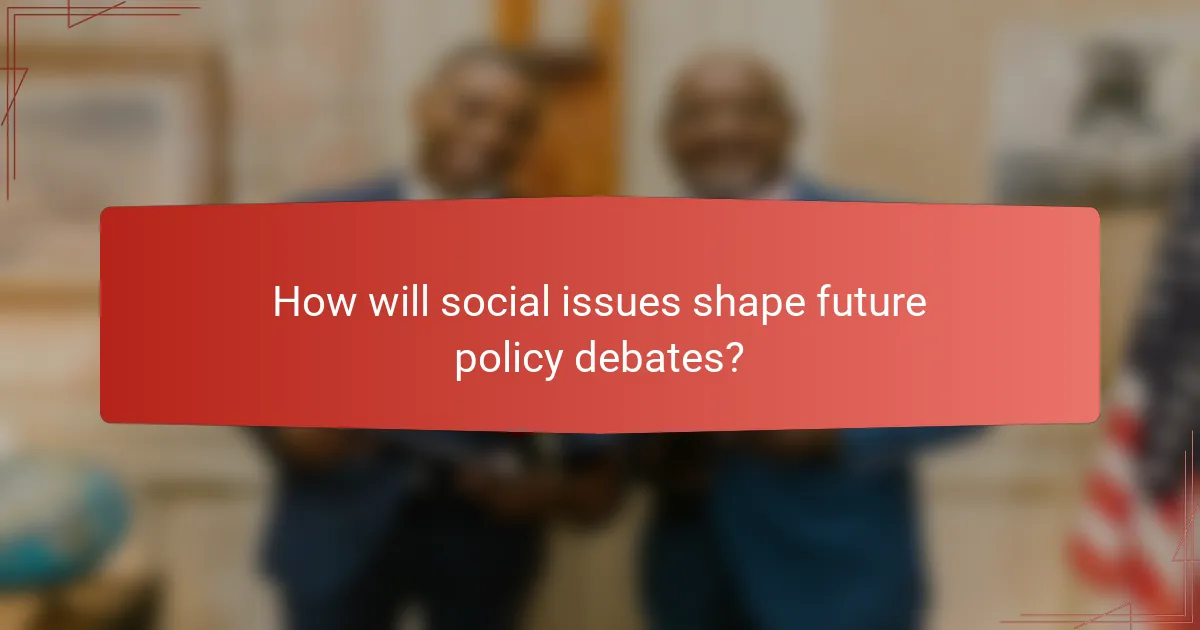
How will social issues shape future policy debates?
Social issues will increasingly influence future policy debates by driving public opinion and shaping legislative priorities. As societal values evolve, policymakers must address these concerns to remain relevant and effective.
Understanding the Role of Social Issues
Social issues encompass a range of topics, including inequality, healthcare access, education, and environmental justice. These issues resonate with the public and can mobilize communities, making them central to policy discussions. Understanding the specific social concerns prevalent in a region can help policymakers tailor their approaches effectively.
Impact on Legislative Priorities
As social issues gain prominence, they often shift legislative priorities toward addressing these concerns. For instance, increased awareness of climate change has led many governments to prioritize sustainable policies and renewable energy initiatives. This shift can result in significant funding allocations and regulatory changes aimed at mitigating social challenges.
Public Engagement and Advocacy
Public engagement plays a crucial role in shaping policy debates around social issues. Grassroots movements and advocacy groups can amplify voices and influence decision-makers. Policymakers should actively seek input from these groups to ensure that proposed solutions are inclusive and address the needs of diverse populations.
Challenges and Considerations
While social issues can drive meaningful policy change, they also present challenges. Policymakers must navigate differing opinions and potential backlash from constituents. Balancing competing interests and ensuring equitable solutions requires careful consideration and ongoing dialogue with stakeholders.
Examples of Social Issues in Policy Debates
Recent examples of social issues shaping policy debates include discussions on racial equality, healthcare reform, and climate action. For instance, the Black Lives Matter movement has prompted discussions on police reform and systemic racism, influencing legislation in various jurisdictions. Similarly, the COVID-19 pandemic has highlighted healthcare disparities, leading to renewed calls for universal healthcare access.
Strategies for Policymakers
Policymakers should adopt strategies that prioritize social issues in their agendas. This includes conducting thorough research to understand community needs, engaging with advocacy groups, and fostering transparent communication. Additionally, they should be prepared to adapt policies based on public feedback and emerging social trends.
